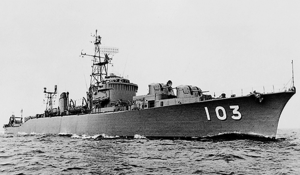Ayanami-class destroyer

Ayanami class member Ayanami
|
|
| Class overview | |
|---|---|
| Name: | Ayanami class |
| Operators: |
|
| Preceded by: | Harukaze class |
| Succeeded by: | Murasame class |
| Built: | 1956–1960 |
| In commission: | 1958–1990 |
| Completed: | 7 |
| Retired: | 7 |
| General characteristics | |
| Type: | Destroyer |
| Displacement: |
|
| Length: | 109 m (358 ft) |
| Beam: | 10.7 m (35 ft) |
| Depth: | 8.1 m (26 ft 7 in) |
| Complement: | 220 |
| Armament: |
|
The Ayanami class was a destroyer class built for the Japan Maritime Self-Defense Force (JMSDF) in the late 1950s. The primary purpose was anti-submarine warfare, so this class was classified as "DDK" (hunter-killer anti-submarine destroyer) unofficially.
This class adopted a "long forecastle" design with inclined afterdeck called , named after the scenic sloping street in Nagasaki City. Their steam turbine propulsion systems were similar to the ones of the Harukaze class, but they varied between each ship in the class as part of the JMSDF's attempt to find the best propulsion system for its future surface combatants.
The Ayanami class were the first JMSDF vessels equipped with six 3-inch/50 caliber Mark 22 guns with Mark 33 dual mounts and Mark 32 lightweight torpedoes with two Mark 2 over-the-side launchers. 3-inch guns were controlled by two Mark 63 GFCSs.
All seven vessels were named after the World War II-era Fubuki and Yūgumo-class destroyer , Ayanami being named after a Fubuki-class destroyer of the same name, which was lost in action at Guadalcanal. The remaining six were also named after World War II Imperial Japanese Navy destroyers lost during the war.
...
Wikipedia
